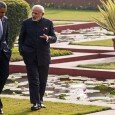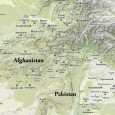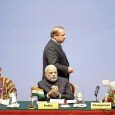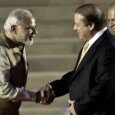By Caesar Mandal –
A new political party’s success surprised everyone in India
It was the silent surge of Aam Aadmi Party that rocked the Delhi winter and forced political experts to look at Indian politics from a different angle.
From Jantar Mantar ground to Delhi Secretariat, it was never an easy journey for Aam Aadmi Party, or AAP, and its leader, Arvind Kejriwal, to transform an apolitical movement against corruption into a powerful political mission. And, by doing so, Kejriwal managed to take along a rainbow coalition of rights activists, whistle blowers, ex-bureaucrats, professionals and volunteers.
Riding a rickety auto-rickshaw — a very common man’s vehicle — Kejriwal started his political journey waving his party’s symbol, a jadoo (broom), against the most professional political managers ofThe Bharatiya Janata Party, BJP, and Indian National Congress. It made many smile at his temerity.
Arvind Kejriwal and his supporters secured 28 out of 70 seats in Delhi assembly polls, denying BJP a clear sweep and leaving Congress politically irrelevant and faltering
But on December 8, the political class of Delhi was forced to acknowledge that AAP’s performance as a debutant political party was undoubtedly phenomenal. Kejriwal and his supporters secured 28 out of 70 seats in Delhi assembly polls, denying BJP a clear sweep and leaving Congress politically irrelevant and faltering.
 Who is Arvind Kejriwal?
Who is Arvind Kejriwal?
Born in a well off family in ‘Jatland’ Haryana, 45-year-old Arvind Kejriwal, an alumnus of IIT-Kharagpu, one of the most prestigious institutes in the sub-continent, started his career with TATA Steel. But soon, he preferred a bureaucrat’s life and joined Indian Revenue Service. As an Income Tax officer, he chose to fight against corruption in the system and formed an NGO Parivartan (change).
In 2006, Kejriwal left his government job and started another journey. From a RTI (Right to Information) activist to drafting the Jan Lokpal Bill (to make peoples’ representatives accountable to the people and to stop corruption), Kejriwal emerged at the forefront of social change.
Aam Aadmi Party
From an activist to politician, Kejriwal’s decision to float Aam Aadmi Party in November 2012 forced him to part way from his mentor Anna Hazare, the octogenarian Gandhian crusader.
In Kejriwal’s own words: “When all political parties remained silent on corruption, then it was the time of action. We entered politics not to come to power; we entered politics to change the corrupt political system forever.”
Taking up a broom in hand, his venture to clean up the mess of corruption in politics started from the Delhi assembly polls with a firm slogan: “Iss bar chalega jadoo.”
Mainly focused on transparent governance, AAP’s election manifesto talks about Bijli, Pani, Mahengai (Power, Water and Price rise) — the concern of each Delhiite these days.
The landslide victory of Kejriwal against three times Delhi Chief Minister Shiela Dixit, along with 27 more legislators, ended the two party (BJP and Congress) binary in the Indian capital.
AAP: another Congress?
Kejriwal’s relentless effort to bring change in the system and his association with the activists from leftist background prodded several political experts to term AAP as a leftist party. But for Kejriwal, AAP is very much solution focused rather than ideology driven.
“There is an age old tendency to pin down political parties as left, right, centre etc etc. In the process, everyone forgets the issues at hands and their solutions. Our goal is to remain solution focused. If the solution to a problem lies on the left, we are happy to consider it. Likewise, if it is on right, or at the centre, we are equally happy to consider it,” says Kejriwal.
Shivam Vij, Delhi based journalist and political expert, finds a similarity between Indian National Congress and AAP for the latter’s deliberate distance from both identity and ideology-driven politics. Picking up broom as the symbol, AAP has gone closer to the heart of problems of the Indian society.
But AAP’s cautious denial to any particular identity made it as an attractive option for all classes. Identifying the basic household issues, AAP also provided an unannounced patronage to the middle class. From a secular, socialist, neo-liberal approach, lacking a singular identity, Vij finds AAP to be a new avatar of the Indian National Congress.
 A new hope for Indian politics?
A new hope for Indian politics?
The stunning debut of AAP in electoral politics —that too in the Indian capital — brings a hope of beginning of an alternative political culture.
Kejriwal will remain a pioneer among the activists, who dared to push boundaries of an activist’s comfort zone to enter into the “hall of disgrace” marred with money, muscle and mechanism. He has vowed to dispel the rampant cynicism about politics and politicians. Kejriwalis seen by many as an icon for the activists, Indian youth and whistle blowers to redefine Indian Politics.
A section of political experts, however, does not feel that AAP’s performance in Delhi assembly polls is surprising. The experts feel that for long, people were looking for an alternative. Kejrival emerged as the man who struck a chord with disgruntled masses. The spontaneous formation of AAP units in other parts of India corroborates that people were eager for an alternative.
Indian political experts do not rule out the possibility that AAP can replicate its Delhi performance in other parts of the country. Kejriwal is smart enough to cobble up a variety of groups under a common umbrella, from Indian urban class to rural population
Challenges after success
Indian political experts do not rule out the possibility that AAP can replicate its Delhi performance in other parts of the country. Kejriwal is smart enough to cobble up a variety of groups under a common umbrella, from Indian urban class to rural population.
But there is, unsurprisingly, uncertainty about the fate of AAP and other political leaders say they welcome AAP’s performance but prefer to wait and watch.
“AAP has came up as a viable alternative to the Congress and BJP. We have to watch and see the party’s future political programmes and policies before supporting it,” said Prakash Karat, the general secretary of Communist Party of India (Marxist).
The writer is a journalist based in New Delhi, India. He can be reached at [email protected]































































































